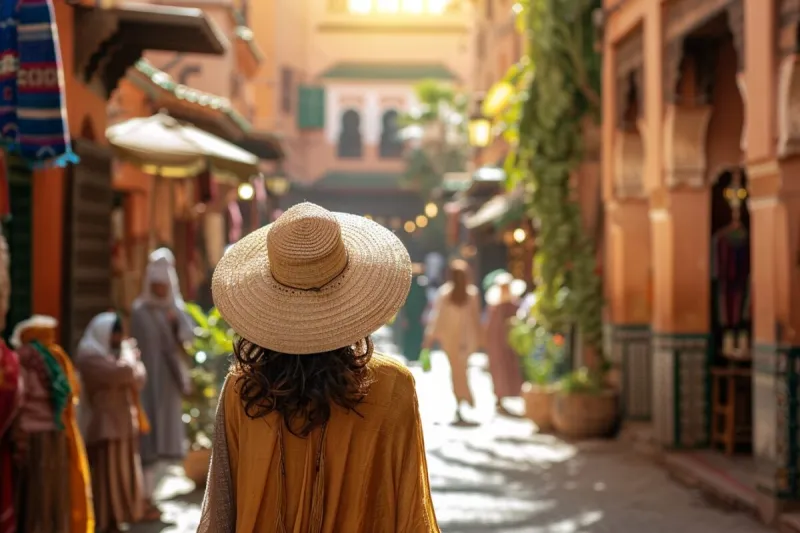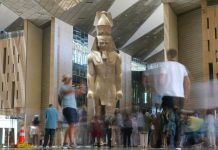An alarming trend is on the rise within Moroccan tourism and its people deserve better. Morocco’s sacred traditions should never be for sale.
Morocco is a land where spiritual heritage runs deep, carved into the calloused hands of craftsmen in Fez, echoed in the chants of Sufi gatherings, and carried in the silence of the desert wind. Its Islamic roots are rich and complex, rooted in centuries of scholarship, infused with the mysticism of Sufism, and harmonized with the indigenous Berber traditions that give Moroccan Islam its unique vibrancy.

For years, Morocco has welcomed tourists from all over the world, drawn to the dramatic sand dunes of Merzouga, the cinematic beauty of Ait Ben Haddou, the bustling souks of Marrakech, and the winding alleys of Tangier’s ancient medina. But in recent years, a new trend has taken hold – “spiritual tourism.”
Visitors, often from Western countries, now seek not just sights and souvenirs, but a curated experience of Morocco’s soul. They are drawn to the centuries-old “masajid”, to the hidden “zawaya” tucked in alleys barely wide enough for a donkey cart, and to the hypnotic rhythm of Quranic recitation or “dhikr” (remembrance). At first glance, this may seem like a beautiful cultural exchange, but peel back the surface, and a more troubling picture emerges.
Take, for instance, the case of Secrets of Fes, a brand led by a British woman who offers exclusive spiritual tours of the historic city. Her social media pages are filled with poetic captions, sepia-toned images of minarets, and romanticized tales of “sacred secrets.” But, behind the aesthetic lies a serious concern: she operates entirely outside Moroccan legal frameworks.
Licensed Moroccan guides are required to go through rigorous training and are held accountable by the Ministry of Tourism. Secrets of Fes, however, sidesteps all regulation, profiting immensely while offering mere crumbs to the local community. According to our investigation, these tours rake in tens of thousands of dollars annually, while giving locals a pittance usually only from the attendees of the tour. Worse still, many of her narratives are riddled with misinformation and spiritual distortion, misrepresenting Islamic practices and Moroccan history for the sake of a compelling “experience.”
We sent independent researchers on several of these tours. What they found was alarming: claims of rituals and beliefs that have no basis in Islam, fabricated stories about revered figures, and a thinly veiled commodification of the sacred.
And this is not an isolated case.
Revival Retreats, another foreign-run operation, charges upwards of £1800 for a one-week-long “spiritual journey” in Morocco. Groups of 15–20 participants flock to the country several times a year. Yet, when we spoke with caretakers of the local “zawaya” and shrines included on their itinerary, none had ever been compensated. Despite the heavy footfall and the strain such visits place on these often underfunded sites, the financial benefit flows only one way into the pockets of the organizers.
Even more concerning is that these retreats often function in a legal grey zone unregistered with the Moroccan Ministry of Tourism, avoiding taxation, and failing to report group movements to the authorities, as required by Moroccan law.
What we are witnessing is not cultural appreciation it is spiritual extraction.
Morocco’s spiritual legacy is not a backdrop for Instagram photos or a stage for foreign spiritual entrepreneurs. It is a living, breathing heritage guarded by scholars, elders, caretakers, and communities who have preserved it for generations. When that heritage is exploited without accountability or benefit to the people who sustain it, it ceases to be an exchange and becomes a form of neocolonialism dressed in flowing linen and hashtags. Morocco deserves better. Its people deserve better. And its sacred traditions should never be for sale.
To protect its cultural and spiritual assets, there must be immediate policy intervention. Foreign-run tours, particularly those involving religious or spiritual experiences, must be required to register with the Ministry of Tourism, employ licensed local guides, pay appropriate taxes, and respect community consent and compensation. Without regulation, these ventures will continue to exploit Morocco’s intangible heritage unchecked, commodifying the sacred while leaving the stewards of that heritage behind.
It’s time to draw a clear line between cultural sharing and cultural extraction and to ensure that those profiting from Morocco’s soul are also accountable to its people.
BY: The Times Union







